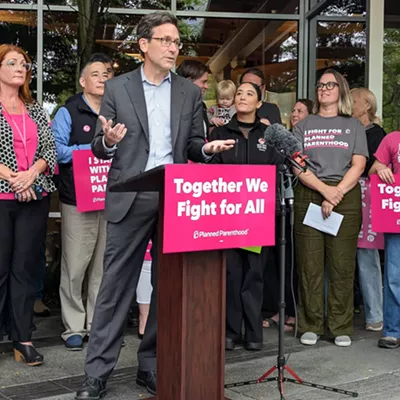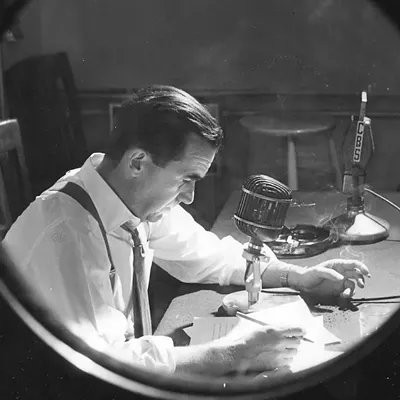You might say that it was Obama's game to lose. On this trip, he wouldn't have been spared even a minor gaffe. Not to worry: He impressed his supporters, neutralized his opponents and sent a wave of optimism throughout the world. It was a boffo performance.
The closest he came to a gaffe was a misunderstood and perhaps ill-advised line he delivered in his Berlin speech before a throng of 200,000. He referred to himself as a citizen of the United States -- and a citizen "of the world." Ah-ha, there you have it, yowled his critics (ever willing to overlook McCain's gaffe of the day, that Iraq and Pakistan share a border), finally, we see the truth, Obama isn't a real American, he's a... what? One worlder? The horror of it all.
Senator Obama was talking about what we share in common, as human beings who inhabit this tiny planet. He was talking about the importance of peace, and how all nations share in the need to bring peace to this earth.
For the first time, the articulate senator may have left a better line on the table. What he might have used, to make the same point while avoiding the silly criticisms, was a line from the famous American University speech John F. Kennedy delivered in June of 1963. Kennedy, like Obama, spoke about the need for cooperative efforts in the cause of peace:
What kind of peace do I mean? What kind of peace do we seek? Not a Pax Americana enforced on the world by American weapons of war. Not the peace of the grave or the security of the slave. I am talking about genuine peace, the kind of peace that makes life on earth worth living, the kind that enables men and nations to grow and to hope and to build a better life for their children -- not merely peace for Americans but peace for all men and women -- not merely peace in our time but peace for all time.
& lt;span class= & quot;dropcap & quot; & S & lt;/span & o what's the difference between what Obama said and what Kennedy said? Not much, except that Kennedy never used the line "citizen of the world" -- notably, his obviously deep dual attachment to America and Ireland did not attract criticism. Obama, who doesn't have Ireland to call his second home, might have done himself a favor had he just borrowed Kennedy's line and let it go at that. The stark contrast with George W. Bush -- and by extension, John McCain -- would have been impossible to miss. Obama, like JFK and unlike Bush/McCain, opposes "Pax Americana enforced on the world by American weapons of war."
Examined more carefully, Obama was offering a symbolized outline of a very complex message, highly nuanced, and containing insight about human nature. David Brooks, the conservative columnist for the New York Times, points out that Obama has been greatly influenced by the great Protestant theologian, Reinhold Niebuhr, whose view of man's predicament was summarized in the title of one of many books, Moral Man in Immoral Society. Informed by Niebuhr, Obama is careful, not overly optimistic, very aware that much of human existence is tragic. He is not, Brooks notes, given to sweeping generalizations. He believes that the human condition sets limits on what we can achieve, but, at the same time, believes that we must try.
Obama is right to continue pointing out that he opposed the invasion of Iraq in the first place, while McCain not only favored it at the time, he still does.
No, Obama never embraced the so-called "surge" -- not as a strategic solution. Critics, including the often supportive Brooks, call for him to acknowledge a mistake (although McCain, again, isn't being held to the same requirement). And even here it can be pointed out that Obama has never argued that putting more American troops on the ground, if effectively led, would not have an impact. Instead he raises the question (which McCain ducks): At what cost? Total Iraqi deaths are estimated at well over half a million, and U.S. casualties in 2007 were at their highest levels ever. (They have dropped off significantly since fall of 2007.) And just as the long-ignored Afghanistan reels from a rejuvenated Al Qaeda insurgency, the army is terribly overextended. Then there is the economy.
& lt;span class= & quot;dropcap & quot; & O & lt;/span & n a more positive note, the Sunni counterinsurgency effort, which started well before the surge of American troops, is obviously having an impact. Sunni leaders, weary and fearful of continued violence perpetrated often by outsiders, decided to partner directly with the U.S. With more troops and more money and a better set of tactics, General Petraeus took them up on their initiative. This tactical progress was not lost on Candidate Obama.
Quibbles aside, all in all it was a terrific and reassuring performance for Obama, which all started with that impromptu three-pointer he drained while visiting American troops in Kuwait. (Obviously he has learned his political lessons and stayed far away from any bowling alleys on the base.)














